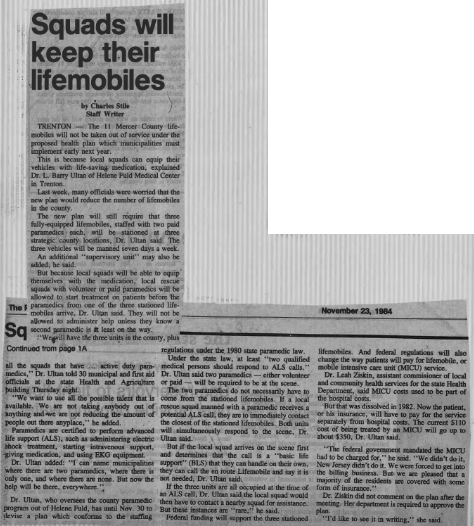
Princeton Packet
23 November, 1984
Squads will keep their lifemobiles
Author: Charles Stille
Staff Writer
TRENTON — The 11 Mercer County lifemobiles will not be taken out of service under the proposed health plan which municipalities must implement early next year.
This is because local squads can equip their vehicles with life-saving, medication, explained Dr, L. Barry Ultan of Helene Fuld Medical Center in Trenton.
Last week, many officials were worried that the new plan would reduce the number of lifemobiles in the county.
The new plan will still require that three fully-equipped lifemobiles, staffed with two paid paramedics each, will be stationed at three strategic county locations, Dr. Ultan said. The three vehicles will be manned seven days a week.
An additional “supervisory unit” may also be added, he said.
But because local squads will be able to equip themselves with the medication, local rescue squads with volunteer or paid paramedics will be allowed to start treatment on patients before the paramedics from one of the three stationed life- mobiles arrive, Dr. Ultan said. They will not be allowed to administer help unless they know a second paramedic is 31 least on the way.
“We will have the three units in the county, plus all the squads that have … active duty paramedics,” Dr. Ultan told 30 municipal and first aid officials at the state Health and Agriculture building Thursday night.
“We want to use all the possible talent that is available. We are not taking anybody out of anything and we are not reducing the amount of people out there anyplace,” he added.
Paramedics are certified to perform advanced life support (ALS), such as administering electric shock treatment, starting intravenous support, giving medication, and using EKG equipment.
Dr. Ultan added: “I can name municipalities where there are two paramedics, where there is only one, and where there are none. But now the help will be there, everywhere.”
Dr. Ultan, who oversees the county paramedic program out of Helene Fuld, has until Nov. 30 to devise a plan which conforms to the staffing regulations under the 1980 state paramedic law.
Under the state law, at least “two qualified medical persons should respond to ALS calls.” Dr. Ultan said two paramedics — either volunteer or paid — will be required to be at the scene.
The two paramedics do not necessarily have to come from the stationed lifemobiles. If a local rescue squad manned with a paramedic receives a potential ALS call, they are to immediately contact the closest of the stationed lifemobiles. Both units will simultaneously respond to the scene, Dr. Ultan said.
But if the local squad arrives on the scene first and determines that the call is a “basic life support” (BLS) that they can handle on their own, they can call the en route Lifemobile and say it is not needed, Dr. Ultan said.
If the three units are all occupied at the time of an ALS call. Dr. Ultan said the local squad would then have to contact a nearby squad for assistance. But these instances are “rare,” he said.
Federal funding will support the three stationed lifemobiles. And federal regulations will also change the way patients will pay for lifemobile, or mobile intensive care unit (MICU) service.
Dr. Leah Ziskin, assistant commissioner of local and community health services for the state Health Department, said MICU costs used to be part of the hospital costs.
But that was dissolved in 1982. Now the patient, or his insurance, will have to pay for the service separately from hospital costs. The current $110 cost of being treated by an MICU will go up to about $350, Dr. Ultan said.
“The federal government mandated the MICU had to be charged for,“ he said. “We didn’t do it. New Jersey didn’t do it. We were forced to get into the billing business. But we are pleased that a majority of the residents are covered with some form of insurance.”
Dr. Ziskin did not comment on the plan after the meeting. Her department is required to approve the plan.
“I’d like to see it in writing,’’ she said.